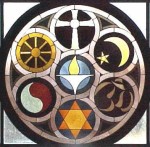![]() Whenever I find myself away from the lights of our urban sprawl — up at Bishop’s Ranch in Sonoma County, for example, or driving across the vast expense of the Western US — I never fail to be astonished when I look up into the night sky, and behold the incredible beauty of the shining stars and the cosmic light of the Milky Way. My astonishment comes, of course, from the beauty of the night sky, but it also comes from the knowledge that the light I see left those stars unimaginable numbers of years ago, and is only now reaching earth. And more amazing still is the knowledge that some of those stars don’t even exist anymore — but we won’t know that until the light fades, probably unimaginable numbers of years from now.
Whenever I find myself away from the lights of our urban sprawl — up at Bishop’s Ranch in Sonoma County, for example, or driving across the vast expense of the Western US — I never fail to be astonished when I look up into the night sky, and behold the incredible beauty of the shining stars and the cosmic light of the Milky Way. My astonishment comes, of course, from the beauty of the night sky, but it also comes from the knowledge that the light I see left those stars unimaginable numbers of years ago, and is only now reaching earth. And more amazing still is the knowledge that some of those stars don’t even exist anymore — but we won’t know that until the light fades, probably unimaginable numbers of years from now.
Those shining lights, and their unfathomable journey through time and space, remind me that our human existence is a moment in an expanse of time so vast that we can hardly begin to contemplate it. We are sitting here tonight as the result of a long series of events that started with the Big Bang billions of years ago and has extended out over that vast distance of time through the formation of the galaxy, the solar system, our planet, and the long evolutionary development of life on earth from simple organisms to the complexity that we are. This history has moved forward from that Big Bang, and moves forward still. But we can only understand it backwards. We are only able to make this history meaningful by looking back from where we are now toward the beginnings of our universe. And so much of what we are trying to look back at, in order to understand how we came to be here now, is still shrouded in mystery. And yet, we continue to explore the universe as deeply as we can in our insatiable pursuit of the question, “How did we come to be here?” To paraphrase Kierkegaard, Life moves forward, but it is only understood backwards.
This is true of the life of the universe, and is also true of each of our individual lives. We live our lives forward from the moment of our birth, but we only make sense of our lives — make our lives meaningful — by looking backward from the point at which we now stand. And as we grow and mature, as we gain experience with both joy and sorrow, how we make sense of our lives, the meaning that we are able to take from our lives, invariably shifts as our perspective shifts. Just as physicists and astronomers look back into the light of ancient stars and seek to construct a narrative of our universe that renders it sensible and meaningful, so are we constantly writing and re-writing our own narratives to give sensibility and meaning to the journey of our personal lives.
What is true of our lives is also true of the life of Jesus. His life moved forward from the moment of his birth, but the church has only been able to make sense and meaning of his life by looking backward from a particular point in time.
On the day that Jesus of Nazareth was born, his birth was of interest to no one beyond his family and their friends, and perhaps the community and synagogue into which he was born. His family held no important position, and their existence was not considered any more important than that of the average Nazarene.
So no one took particular notice of Jesus, as the lack of any substantive stories about his childhood seems to symbolize. No one took notice of Jesus until he burst upon the scene proclaiming, “The kingdom of God has drawn near.” No one took notice of Jesus until his preaching and his teaching and his healing of people gave him a reputation that drew people to him in large numbers. The rabbi Jesus was someone to behold — the rabbi Jesus was not to be missed.
Then it all seemed to fall apart. Jesus was arrested, crucified, his movement imploded, and everyone thought it was over. And into the dark despair of his most intimate friends, at the moment when any hope that being with Jesus had kindled within them seemed to fade, a singular, life-altering, mind-bending moment irrupted into their lives: the Risen Christ appeared among them. They experienced Jesus as somehow being alive. It was, you might say, the theological equivalent of the Big Bang. It was the moment when everything changed.
And it was also from that singular moment that those first Christians began to look backward through the life of Jesus. In the Risen Christ, they experienced God as with them. And as they thought about their time with Jesus in the light of this experience, they realized that whenever they were with Jesus, they had experienced God as with them in him. And so, this must be what Jesus had always been, from the very moment of his birth: God with them, God with us. In Hebrew, that idea is captured by the word, “Emmanuel”.
Held, as they were, in thrall by this perception, by this experience of Emmanuel — God-with-us in Jesus — they began to build a narrative of Jesus’ life that actually begins with the Resurrection and moves backward through everything that they remembered of what Jesus had done and said. They tried to tell us as much as they could of the facts of Jesus’ life, but more than that, they wanted to tell us that when they were with Jesus, they knew that God was with them. They wanted us deeply to know this, so that we could experience God with us in Jesus, as well. Because for them, this truth held hope for the world. For them, this truth held the key to living a transformed life rooted in God. For them, this truth was everything.
So tonight, as we hear once again Luke’s achingly beautiful telling of the story of Jesus’ birth, it is just like going out into a dark place and looking up at the light of the stars. That story comes to us as a light that has traveled through time and space, a light whose origin is shrouded in mystery. We so often end up wondering about its factuality, raised as we have been in an environment that equates truth with fact. But that is not the kind of wondering Luke’s story is meant to provoke in us. No, Luke’s story is meant to provoke in us the same kind of wonder that we experience when we look up into the night sky. It is meant to move us into a place of awe, which is why it is so awe-somely told: with angels singing, and shepherds abiding, and animals lowing, and the stars shining in the heavens. Just as the lives of the first followers of Jesus ended up revolving around the Resurrection, that singular moment that changed everything, so did they tell the story of Jesus’ birth as if it were the singular moment around which all of creation revolved on that night so long ago. Because they were not simply telling us the story of a baby’s birth; they were telling us the story of God with us in Jesus.
I don’t know what your life might be revolving around these days. Maybe you’re not sure yourself, at least some of the time. But tonight, each of us is invited once again to stand in the darkness of a hurting, imperiled, uncertain world and look up at the light of the Christmas story. As that beautiful light filters down to us from centuries ago, our task is not to analyze it, but to fall in love with it. And when we fall in love with this beautiful, ancient story, we fall in love with Emmanuel. And we can believe again in the possibility and the power of God-with-us. It is a power that completely changed the lives of Jesus’ first friends, and it is a power that can change our lives now. And through us, it is a power that can change the world.
God-with-us is the power of hope. God-with-us is the power of love. It is the power of realizing that God is not simply out there somewhere, but is within and among us, as Jesus himself said (Luke 17:21). Human history is a testament to how badly we need this power of God-with-us, and how often we misunderstand it, or forget it all together.
We remember tonight the birth of Jesus in history, the appearance of Emmanuel: God-with-us, and the beauty of the light he brought into the world. We pray tonight for the re-birth of Christ in our hearts, that we may know the power of God-with-us, and shine that beautiful, ancient light into the dark, suffering corners of our own souls, and of the world.

